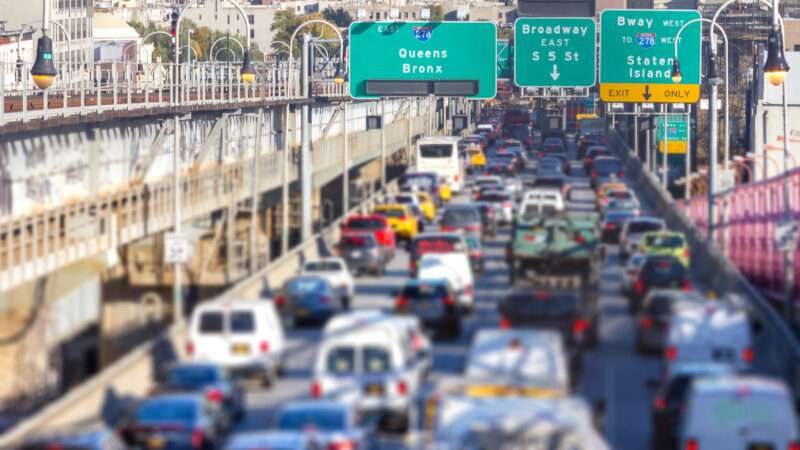
New York's four-year-old plan to charge drivers entering lower Manhattan has hit yet another bump in the road after the state of New Jersey filed a lawsuit to stop it.
The lawsuit, filed on Friday in U.S. District Court in New Jersey against the Federal Highway Administration (FHWA), argues that federal officials didn't do a thorough enough environmental analysis of the congestion pricing scheme before signing off on the project earlier this summer.
FHWA's "fundamentally flawed and improperly truncated decision-making process" failed to study the impacts on New Jersey communities from all the traffic (and attendant pollution) that would be diverted by a Manhattan congestion charge, reads the suit.
The complaint asks the court to freeze the implementation of congestion tolls while additional studies, potentially taking years, are performed.
New York's congestion pricing scheme was first approved by the state Legislature back in 2019, as part of that year's budget agreement. The plan is to charge drivers entering Manhattan below 60th Street a fee to both combat gridlock and raise money for New York City–area transit agencies.
Last year, New York officials suggested tolls could be $23 for rush-hour trips and $17 for non-rush-hour trips.
Tolling federal-aid highways, which New York's congestion pricing plan would do, requires federal approval. The feds' needed sign-off in turn triggers the National Environmental Policy Act (NEPA), which has added years to congestion pricing's implementation.
NEPA requires federal agencies to examine the environmental impacts of the decisions they make, whether that's releasing funding for a new highway, permitting a new coal mine, or (as in this case) approving new tolls on federally funded roads.
New York's congestion pricing was supposed to be up and running by January 2021.
But the NEPA review process—which included some possibly deliberate foot-dragging by the Trump administration—wasn't finalized until June 2023. With federal approval in hand, the hope was that tolls could be in place by May 2024.
New Jersey's lawsuit likely derails that timeline as well.
NEPA also allows third parties to sue federal agencies if they believe the analysis they performed didn't analyze all "significant impacts." As a result, NEPA has become a go-to means for opponents of a project to gum up its implementation with environmental litigation.
Lawsuits like New Jersey's are "extremely normal," says Eli Dourado of the Center for Growth and Opportunity. "Plaintiffs bring a complaint [that] doesn't state the true objection to the project. They sue on environmental grounds because that's the cause of action that's available to them."
Since it first passed, New Jersey politicians have been objecting to New York's congestion pricing plan on primarily economic grounds. They've complained that the tolls would harm New Jersey commuters' pocketbooks while directing all the revenue to New York transit agencies.
In 2019, New Jersey Gov. Phil Murphy demanded that Garden State commuters receive special discounts. The same year, Reps. Josh Gottheimer (D–N.J.) and Jeff Van Drew (R–N.J.) introduced federal legislation to exempt their state's drivers from the charges.
Those complaints haven't abated over the years.
"The FHWA has unlawfully fast-tracked the agency's attempt to line its own coffers at the expense of New Jersey families," said Murphy in a press release announcing the state's lawsuit. Sen. Bob Menendez (D–N.J.) called congestion pricing a "shakedown."
New Jersey's lawsuit decries the "significant financial burden" of congestion pricing and cites Murphy's description of the policy as a "huge tax" being levied on New Jersey families.
Marc Scribner, a transportation policy analyst with the Reason Foundation (which publishes this website), says that New Jersey residents' complaints about New York's congestion pricing scheme have some merit—given how the policy is being sold and implemented.
Well-designed congestion pricing can be a huge benefit to car commuters by eliminating the urban gridlock that reduces the total number of people who can use the roads on a given day.
But supporters of New York's policy have largely pitched the new tolls as a means of funding New York City's subway system that New Jersey's car commuters don't ride. New York's Metropolitan Transportation Authority (MTA), the state agency which operates the subway, will receive the lion's share of the new congestion toll revenue.
"They didn't lead with, 'We're going to stabilize traffic flow and therefore benefit you as motorists,'" says Scribner. "You can understand the knee-jerk reaction from a lot of motorists is that this is a cash grab."
The relatively small zone where congestion charges will apply and the fact that the tolls will likely be a flat rate (as opposed to varying with traffic flows) make New York's policy less than ideal for combating gridlock, argues Scribner.
That also cuts against the benefits New Jersey drivers will receive from the policy.
Nevertheless, the state's NEPA lawsuit won't improve New York's congestion pricing scheme. It won't even stop it. The best-case scenario for New Jersey's lawsuit is that it forces New York and the federal government to do years of additional environmental analysis before implementing the same policy they're trying to impose now.
This represents a recurring problem with NEPA generally, says Dourado.
"They might write another thousand pages no one is ever going to read, and it will take them another couple of years to do it," he says. "But the outcome will be the same in the end."
He suggests limiting judges' powers to pause projects while more NEPA analysis is done. That would chill the desire of litigants seeking only to delay a project from filing NEPA lawsuits in the first place.
"You can analyze something forever," says Dourado. "I think we should say enough is enough at some point. And we're well beyond that point."
The post New Jersey Files Environmental Lawsuit To Delay Manhattan Congestion Tolls appeared first on Reason.com.







